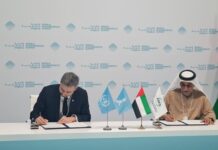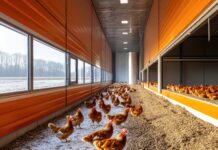Martaş, one of the most established manufacturers of frozen food in Turkey, raises its export targets by investing in technology with TOMRA Food equipment.
Established as a cooperative for processing quality agricultural food products grown in the Marmara and nearby Aegean regions, Martaş has pioneered frozen food production in Turkey. It is upgrading its facilities while continuing production at its two processing facilities located in Bursa and Mustafakemalpaşa. With the installation of a TOMRA Food´s belt sorter in its Mustafakemalpaşa facility, Martaş has raised its export targets with its high product quality.
Martaş improves its frozen food production every year. It has a processing capacity of 40,000 tons of fruit and vegetables, and a cold storage capacity of 20,000 tons. While it produces a wide range of frozen foods, Martaş particularly focuses on five fruit and five vegetable types – spinach, peas, peppers, broccoli, corn, oranges, cherries, sour cherries, figs and apricots – and has gained a significant position in the pepper export industry. The company decided to purchase a TOMRA machine in order to further increase food safety and quality, as Ayhan Gürbay, General Manager of Martaş explains; “We determined the product types that required investment in technology for the export markets. Our exports continue to grow every year. Currently, we export 60 percent of our production, with the rest going to the domestic market. All our target markets expect high product quality, so we regularly invest in our technology. We aim for perfection in our product’s quality by utilizing our TOMRA machine before the IQF process.”
Our priority is food safety
Martaş offers products according to the season and variety in packages of different weights from 1kg to 20kg. It sells 95% of its products to the Hospitality sector, and also offers products for retail. It exports to Europe, mainly to the United Kingdom, Italy, France, Germany, Netherlands, Belgium, Romania and Bulgaria. Ayhan Gürbay says; “Recently, we have extended our target markets with Far Eastern countries. We are planning to reach a production volume of approximately 20,000 tons in 2021, and we aim to achieve a continuous growth of 20-25 percent every year. Our absolute priority is food safety and quality, while increasing our production capacity. The main strength of TOMRA’s belt sorter is its sorting capability, not only based on color, but also on important criteria such as product density and humidity. Installing the machine before the IQF process gives us control over food safety and quality from the start.”
Gürbay adds: “If you performed the control after IQF, the risk of products with defects would increase. The products that would be sorted later can be included in the IQF process. The earlier you perform the control and the more meticulous it is, the more you will increase the product’s quality. Additionally, since you do not include the defective products in the freezing process, you achieve cost savings while enhancing the yield of the process line. That’s why we have deployed the TOMRA machine before the IQF.”
It is important to ensure quality at initial stages of processing
Emphasizing that every product may have different requirements, Ayhan Gürbay explains: “In pea processing, you must pay attention to snails and similar insect species that can be found naturally in the products. With spinach, you need to sort plants with similar leaves or insects that may come from the field. For example, it may be difficult to sort snails by only using the optical sorting machines with cameras at the rear of the IQF. The camera and laser system of the TOMRA equipment offers effective sorting performance for foreign materials such as snails and shells. The process for sorting pepper is different. So, the sorting process may differ in every product. The ideal sorting of foreign materials and product defects can only be achieved with technological solutions such as the TOMRA Food sorters.”
Underlying their high pepper exports to Europe, Ayhan Gürbay says: “Thanks to its cameras, the TOMRA machine can sort color and tissue defects and product-related defects such as rot in peppers. It can also effectively sort out the core, stem and other foreign materials in peppers with its laser system. This means great ease and high yield in our production process.”
Italy’s famous tortellini are filled with Martaş spinach
A renowned Italian pasta manufacturer uses Martaş frozen spinach in the tortellini it markets globally. Martaş frozen fruit products are also popular for use the in pastry and yogurt industries in many European countries.
In the first stage we focus on production of spinach, peas and broccoli with TOMRA
Ayhan Gürbay highlights the importance of being able to process different products at the same time in a specific season, as Turkey is considered to be an agricultural paradise: “Since we use domestic crops, we may require processing different and bulky products in a short timeframe. This means that organizing well our processing lines is important. Optical sorting solutions like TOMRA’s enable us to increase our yield. With TOMRA, we can process different products in the same machine. In the summer, a great variety of products can arrive at the facility and in two weeks, different products may be processed on the same line. Frozen food manufacturers in Europe may source products from other countries at different times and spread the processing over 12 months. However, for us product planning is tighter because we use domestic crops. In this respect, the advantages that TOMRA machines offer cannot be disputed.”
TOMRA Food Turkey’s Sales Manager for Processed Food, Bugra Bulut explains: “At TOMRA, we have a wide range of solutions for on- or off-belt batch sorting of fresh and frozen vegetables, fruits and potato products before and after IQF, from whole on the raw material entry to cut in-process and frozen post-IQF. Our TOMRA sorter uses cameras and laser technology to identify freshly washed, processed and cut vegetable and fruit products the IQF process. It removes product related defects and foreign materials with air guns. Martaş deployed the TOMRA machine before the IQF process. This ensures that only products with the expected quality enter the IQF process. That’s why, besides the increase in quality, processing is facilitated and only high-quality products are delivered to the IQF process.
”Buğra Bulut adds: “Frozen food manufacturers in Turkey may process a variety of products throughout the 12 months of a year. TOMRA provides a unique benefit for producers, because its machines are designed for sorting different product types, so that a variety of vegetable and fruit products can be sorted in the same machine. Since our TOMRA equipment features both a camera and a laser system, it is capable of sorting foreign materials according to characteristics such as chlorophyll, softness, hardness, organic, inorganic, water content, chemical changes in the product, as well as defects such as color, shape and size. With all these features, when we assess the working performance and yield of the TOMRA machine at the Martaş facility, we can say that it works flawlessly for a variety of fruits and vegetables.”








